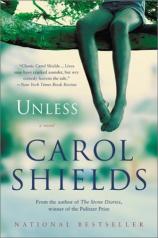Unless
Review
Unless
When I read THE STONE DIARIES, the 1995 Pulitzer Prize winner and still Carol Shields's best-known novel, it was like falling in love. Distracted, I got off at the wrong subway stop. Smitten, I raved to my friends. Shields, in making an ordinary life astonishing, seemed to be writing for all women upon whose unsung existence (at the margins, under the surfaces) the world depends. Later, reading LARRY'S PARTY, her 1997 anatomy --- literally and figuratively --- of an obscure and likable guy, I grasped that men, while equipped with certain advantages, also lurch and stumble toward self-recognition.
UNLESS, her latest book, is oddly framed. There's the title, for one thing, as well as some pretty cryptic chapter headings: "Here's"; "Thus"; "Toward," and so on. When I started reading, I felt as if the book were a jigsaw puzzle and these were the pieces, except I had no clue what the Big Picture was. The voice, however, is immediately absorbing: Ironic, on-to-herself, smart, and drily humorous (when it isn't anguished). It belongs to a 44-year-old Canadian writer, Reta Winters, and it takes us through nearly a year in her life. She has suffered a tragedy --- her daughter Norah, 19, has fled into madness, spending her nights in a homeless shelter and her days on a Toronto street corner, with a sign bearing the word "goodness" around her neck. She isn't dead, but she is dead to the world.
Only much later do we find out what has prompted Norah's despair; for now, suffice it to say that Reta is in unbearable pain, although she is so determined not to fall into self-pity that it is hard for her to express emotion without editorializing (after she writes, "My heart is broken" alongside the graffiti in a public bathroom, she calls it a "whining melodramatic scrawl"). Her sense of normalcy, of happiness, is irreparably compromised.
When I learned, halfway through reading UNLESS, that Shields has breast cancer, it was hard not to imagine Reta as an expression of her creator's own outrage and grief. (Shields herself, in a May 1, 2002, interview on National Public Radio, has said that a different experience --- hearing that one of her daughters had been hit by a car --- was decisive.) Diagnosed in 1998, Shields is now at Stage 4 and, according to a profile in the New York Times Magazine by Maria Russo (April 14, 2002), "she has no dreams of a miracle recovery." I don't mean to review Shields's illness instead of her novel. Yet there is an immediacy to UNLESS, a willingness to take risks, that makes it particularly haunting.
One risk is to make Reta happily married. Shields is rare among modern novelists in her ability to write persuasively about marriage, with neither bitterness nor sentimentality, and to conceive of contentment within it (the Times profile observes, almost enviously, the tenderness of Shields's own long union). "We live in each other's shelter; we fit," says Reta of Tom, her doctor husband. At the same time, the book has an explicitly feminist perspective (also a chancy thing, the average reader's distrust of "isms" being what it is). "Because Tom is a man, because I love him dearly," Reta says, "I haven't told him what I believe: that the world is split in two, between those who are handed power at birth...and...all of us who fall into the...female otherness in which a power to assert ourselves and claim our lives has been displaced by a compulsion to shut down our bodies and seal our mouths."
Yes, she does wax rhetorical at times --- but it's not empty rhetoric, and it feels natural. Reta, one suspects, has always used words as a way to impose order on her distress. It's yet another gamble, of course, to make the protagonist a writer. Although occasionally the choice leads the reader down paths that are a little too abstract for comfort, for the most part it works, enabling Shields to fit Reta out with ideas as well as feelings.
There is, for example, a series of scorching letters to writers who have omitted women from their supposedly universal equations (this pattern of exclusion, Reta speculates, is what caused Norah to retreat in the first place). There is also a chronological list of Reta's publications, including translations of the works of 85-year-old Holocaust survivor and feminist intellectual Danielle Westerman (sage, lonely, with little vanities and a big, tough mind, she's like a cross between Simone de Beauvoir and Elie Wiesel) and a surprisingly successful venture into light fiction, My Thyme Is Up (Shields's sardonic nod to her diagnosis?). This embarrassingly readable book wins the Offenden Prize, which "recognizes literary quality and honours accessibility" (satirizing the publishing world is one of Shields's great delights). Its founders' recipe for enduring fiction: "a beginning, a middle, and an ending."
UNLESS has all three, but the rise and fall of plot is less important than the steady hum of everyday activity. The big event of the book, Norah's "resignation from life," has already happened; the whole point is what it means to go on when everything has been changed by an enormous loss.
And the title? Well, the word unless, Shields seems to suggest, is the essence of what fiction writers do. A hinge between "what is and what could be," it expresses contingency, possibility. When horrific events --- breast cancer, an out-of-reach child --- expose the fragility of human life, unless can reveal "another plane of being." It holds out hope.
Perhaps it is significant that "Not Yet" is the last chapter in this strange, honest, profoundly thoughtful book. Perhaps Shields is saying that this is not the end --- there is more to her story. Let us hope that she is right.
Reviewed by Kathy Weissman on January 24, 2011
Unless
- Publication Date: May 1, 2003
- Genres: Fiction
- Paperback: 336 pages
- Publisher: Harper Perennial
- ISBN-10: 0007154615
- ISBN-13: 9780007154616










